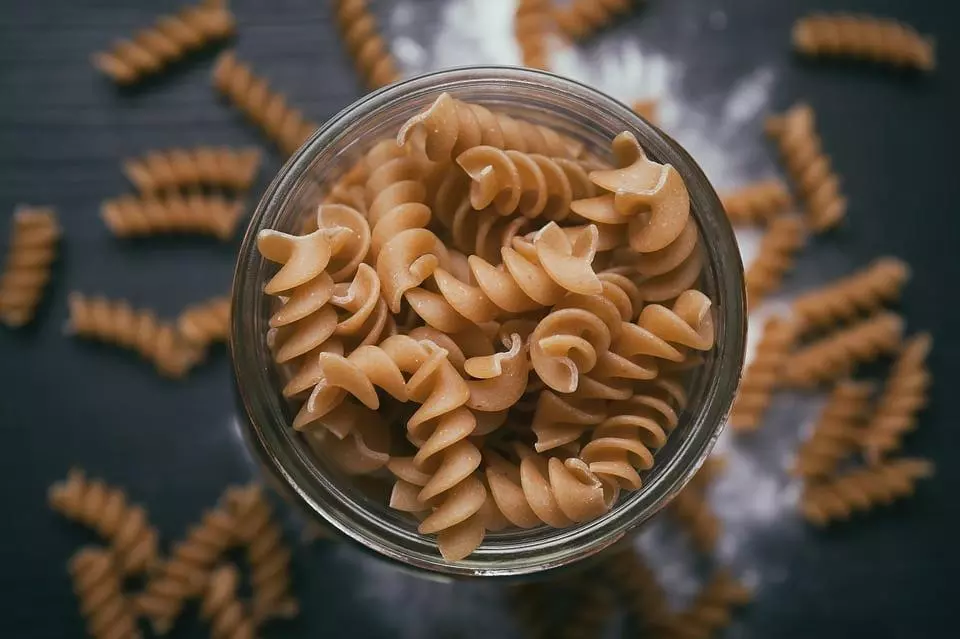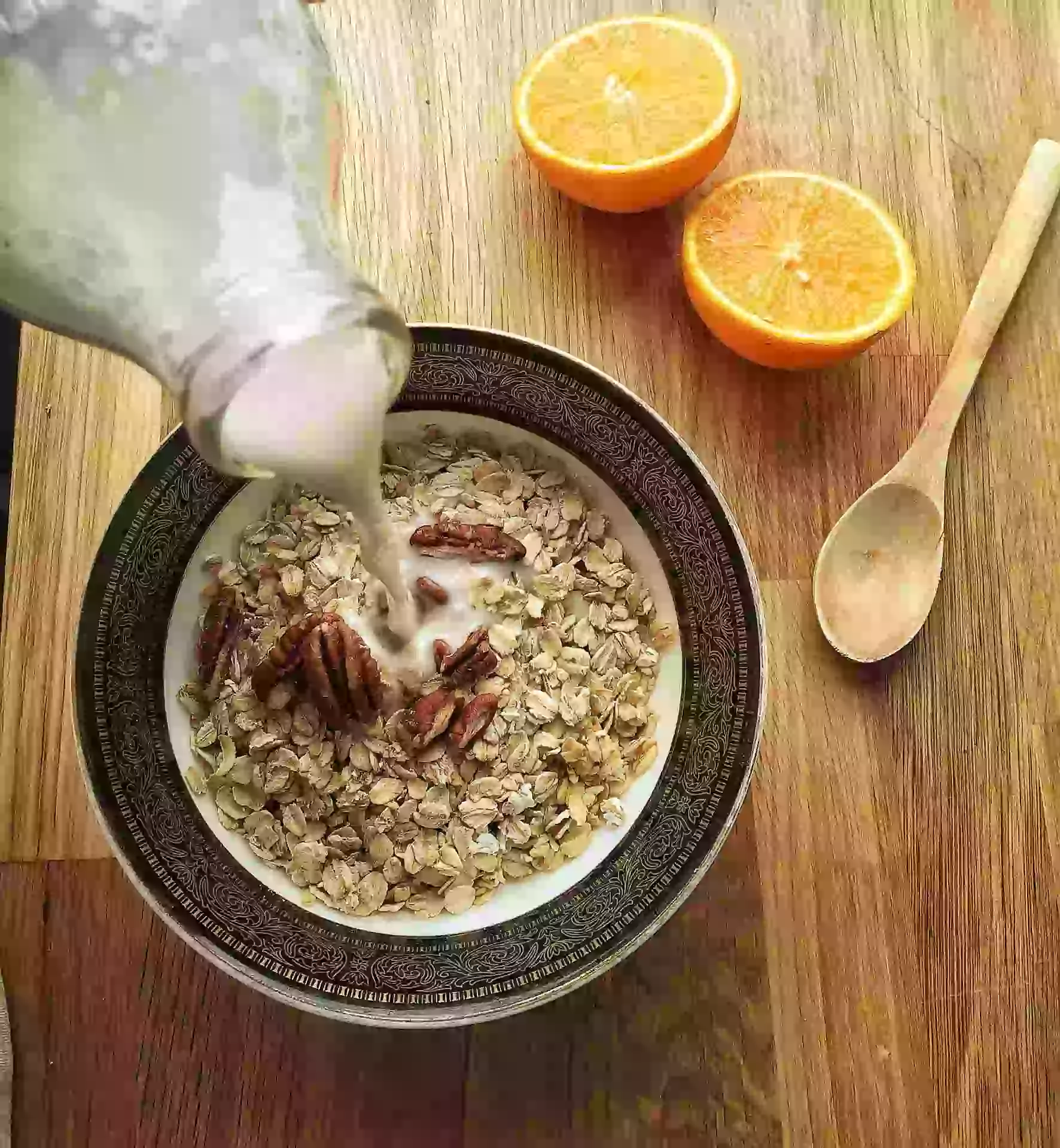This post contains affiliate links from which I may receive a small commission, at no extra cost to you. In no way does this affect my opinion or the information I provide on the product. Please read my disclaimer for more info.
Are carbs good for you?
Carbohydrates have been getting quite the bad press lately and the low-carb diets are on the rise. Carbs are seen as the macronutrient to avoid at all costs if you want to lose weight.
Because of these misconceptions, many people are confused about how beneficial carbohydrates actually are to their health.
The truth is carbs are a very important part of the diet— if you choose the right ones of course.
So here’s why carbs are good for you, and which carbs you should actually be eating.

What are carbs exactly?
Carbohydrates are one of the three macronutrients necessary for a healthy diet (along with proteins and fats). They are essentially a chain of sugars that can come together to make even bigger chains.
The ones found in food can be put into three groups: sugar (simple chains, such as glucose), starch (longer chains), and fiber (longer chains that humans can’t digest). Carbohydrates act as a source of energy for the body and also compose some of its molecules.
They are found in fruit, legumes, starches, and in all sorts of cake and cookies.
They should make up around 50% of your daily calorie intake, so if you eat 2000 calories, 1000 should come from carbs. Since a gram of carbs contains 4 calories, you should be eating around 250 grams of carbohydrates a day.

What are the “good” and “bad” carbs?
Not all carbohydrates are the same, which is certainly where all the confusion concerning their health impact stems from. There are two types of carbs: whole and refined (or stripped) [1].
Some refer to them as complex and simple, but it’s important to note that there is a wide range of glycemic indexes (their effect on the body’s glucose levels) in simple and complex carbohydrates.
Some complex carbs can have a glycemic index close to that of a simple carb, and vice versa. It’s therefore more interesting to refer to a food’s glycemic index, or to the “whole” and “refined” denominations [2].
With that being said, whole carbs are the unprocessed carbs that contain all the healthy and nutritious parts. This includes fiber, vitamins, minerals… These types of carbohydrates take a long time to digest, because their structures are more complex.
They are the “good carbs” that can mainly be found in fruits, beans, nuts, and whole-grain foods.
On the other hand, refined carbs have had most of their healthy fiber and nutrients removed. They are quickly digested and have a high glycemic index, meaning that they cause your blood sugar and insulin levels to spike.
They’re found in anything with table sugar such as candy, cakes, soda, and in dairy products.
While you should limit your intake of refined carbs, whole carbs are actually good for you and should be eaten at every meal.
Are carbs good for you?
Carbohydrates should be your body’s main source of energy. They provide fuel for your cells in order for your brain and muscles to function.
Your brain depends on glucose to thrive: disrupting the normal glucose metabolism is dangerous and could potentially lead to the development of brain disorders. [3]

Although fiber, a type of whole carb, can’t be digested by humans, it is beneficial to your gut bacteria, which can make fatty acids from them. These fatty acids could have positive effects on your body, such as reducing inflammation. [4]
Fiber has plenty of other health benefits, such as helping you feel fuller for longer, reducing cholesterol, improving glycemic control, protecting against heart disease, improving digestion and bowel health…
Check out this article on the benefits of fiber and where to find fiber-rich foods if you’re interested in learning more!
In addition, the consumption of fruit and vegetables, many of which are rich in carbohydrates, is associated with a reduced rate of coronary heart disease. [5]
Furthermore, consuming whole-grain foods protects against the development of type II diabetes. Along with legumes, which are also high-carb foods, they improve indicators of glucose in both diabetic and healthy individuals. [6]

Whole grain diets also reduce cardiovascular risk [7], as well as reduce body weight and lower inflammation [8]. Whole-grain consumption is also associated with a lower mortality rate in both men and women. [9]
In addition, if you’re not getting enough carbohydrates, it could affect your mood state.
In one study, people who ate a high-carb low-fat diet had a greater improvement in aspects such as mood disturbance, anger, hostility, confusion, and depression compared to individuals on a low-carb high-fat diet. [10]
Finally, a review of 17 studies found that low-carb diets were associated with a higher risk of all-cause mortality, supporting long-term harm of not consuming enough carbs while presenting no cardiovascular protection. [11]
I could go on and on about the benefits of whole carbohydrates, but hopefully you now realize that carbs are indeed good for you.
Do carbs make you gain weight?
The idea that carbohydrates are fattening is hard to shake off. The myth may stem from the effect carbs have on insulin.
Insulin is the hormone your pancreas secretes after you eat, in order to regulate the amount of glucose in your blood. This makes the glucose convertible into energy by your cells. The more carbohydrates you eat, the more insulin you will have to secrete in order to “use” that glucose.
Insulin is also a fat-burning suppressant. However, it only does that because it would rather use the carbohydrates that are available instead of burning into the fat storage.
If you were to eat the same amount of calories in fats, your body would use those fats instead of the ones in your fat stores as well. This is very simplified of course, but should show you that insulin isn’t the reason for weight gain.

Similarly, insulin promotes fat-storage for the excess glucose in your blood. However, this is only if you eat too many calories and your body cannot burn them all— it has little to do with insulin or the fact that you’re eating carbohydrates.
If you are diabetic and have to take insulin though, an excess of it could lead to weight gain, but this is a pathological situation.
Here is a great and comprehensive article on the issue.
Few studies have linked carbohydrates to obesity. Actually, studies mainly report that a higher intake of carbohydrates is linked to a lower body weight [12].
As mentioned previously, whole carbohydrates are beneficial to your health. Carbs such as fiber, contained in many fruits and whole grains, can even reduce weight and fat gain, primarily by reducing your appetite. [13]
Studies [14] in patients with type-2 diabetes have shown that restricting fruit (rich in carbs) doesn’t have any incidence on the patients’ body weight or waist circumference.
Still on the topic of fruit, a review of studies [15] showed that fresh fruit consumption did not contribute to excess energy intake, adiposity, and obesity, and could even reduce them.
So carbs are good for you and they don’t make you gain weight. But all carbs aren’t created equal…

The carbs that are bad for you.
Despite the health benefits of whole carbs, refined carbs lack healthy nutrients and can have negative impacts, such as encouraging the development of type 2 diabetes.
Consuming an increased amount of refined carbohydrates along with a decreased amount of fiber could indeed be linked to the development of type 2 diabetes. [16]
Therefore, you should limit refined carbs and replace them by healthy whole carbohydrates. Furthermore, some individuals, such as those with type 1 diabetes, should limit their carb intake in order to manage their blood sugar levels and follow an appropriate diet.
Carbs in conclusion
Carbohydrates are an important source of energy for your body. They have many health benefits and should, exceptions aside, constitute an important part of your diet.
However, this implies eating nutrient-dense carbs with high-fiber as much as possible instead of refined sugars.
-Lucie


Comments are closed.